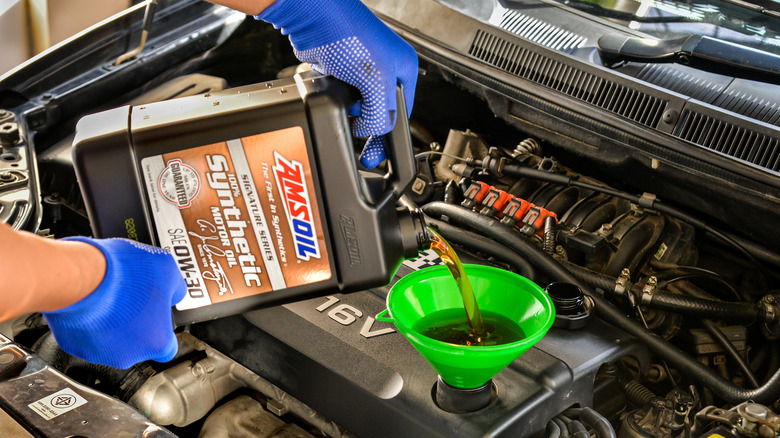Viral TikTok Mechanic Explains The Key Difference Between Major Oil Brands
Owning and caring for an automotive vehicle is all about managing a lot of different fluid levels. You need to regularly top off the gas, change out the motor oil, refill the windshield wiper fluid, and so on. If you want your vehicle to have a long, happy life, it's understandable that you'd only want to provide it with the very best fluids you can get your hands on. Of course, it's also very easy to dismiss the products at the top of the shelf as overpriced brand labels hocking the exact same product in a slightly fancier bottle. There's a degree of truth to this, but it's also not quite that simple, as TikTok mechanic Rich, AKA @FordBossMe, explained in a brief video.
@fordbossme #stitch with @mrglobaltoo Most Motor Oils Are Just the same Oil Repackaged?!
In his video, Rich responded to another TikTok user claiming that most motor oils are completely identical to one another, with the only difference being packaging. As Rich explains, this is half-true, as the basic synthetic oils that serve as the base for motor oil products do all come from the same place. There are only a few ways to "make" oil, after all. While the base of these products are functionally the same, though, the base isn't what automotive brands are actually selling you. What they're selling you is additive packages.
Base oils are generally the same, but the value comes from additive packages
Just about every single motor oil product, from the most generic stuff at the bottom of the shelf to the name-brand, slick-bottled brew at the top, has a similar base oil makeup. The difference is that each of these oils features a different blend and concentration of different additives.
Remember what we were saying about the various fluids in your car? Well, for some of those fluids, there are various additives that can be mixed in to enhance or alter the substance's functionality. For example, diesel fuel additives help to keep fuel injectors clean and remove suspended water, while transmission fluid additives help to condition pressure seals and prevent leaks. Motor oil is another example of a fluid with additives available, and this is where brand variance comes into play: just about every major motor oil brand uses its own proprietary blend of additives intended for different kinds of vehicles and driving situations. For example, if you bought a bottle of Lucas Oil for a motorcycle, that bottle would contain an ordinary oil base alongside additives engineered specifically to enhance a motorcycle engine's operation, helping it operate more cleanly at a lower temperature, for example.
As Rich points out, some of the really top-shelf motor oil products from brands like Redline or Amsoil may have more elaborately-engineered synthetic oil bases created from specific fats and alcohols, but in the end, it's still mostly about the additives. If you're paying more for a particular oil, it's because you want a very specific blend of additives for higher performance.

